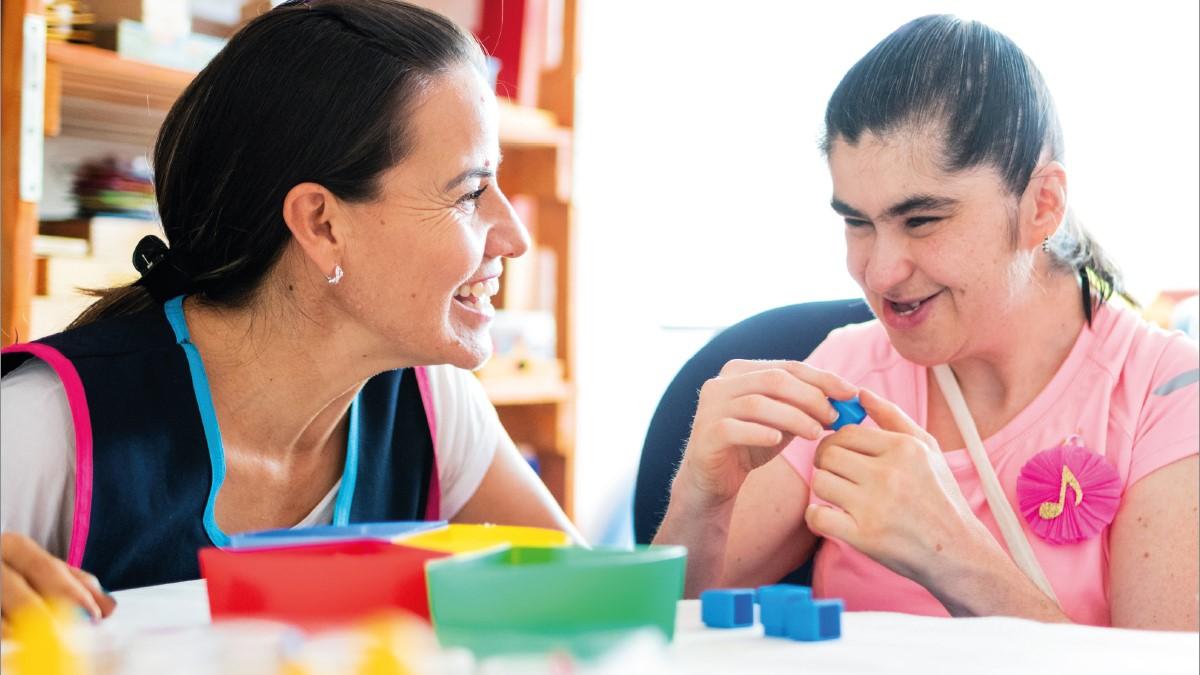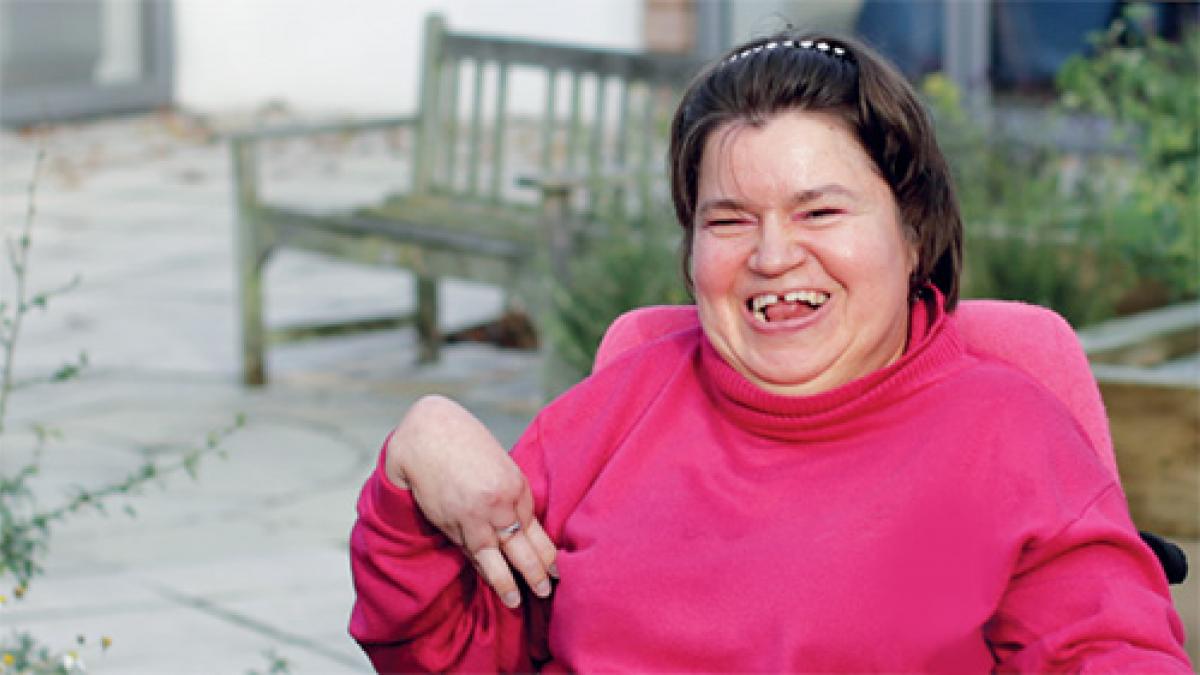The health inequality issues facing adults with a learning disability make for stark reading, Catherine Turnbull investigates

Adults with a learning disability (LD) experience poorer health than the general population. They have a shorter life expectancy and are at greater risk of premature death.
Although they have the same rights to access mainstream health services as the general population and can expect reasonable adjustments to be made to enable this, they regularly receive inadequate health care.
A review, Better Care for All, by the National Institute for Health Research (NIHR) last year found people with learning disabilities are more likely to be admitted to hospital with conditions that could be prevented by better community and primary health care.
There are many barriers that prevent someone with a LD having equal access to care, including physical, psychological, financial, geographical, cultural, language and resource barriers.
Adding to which, people with learning disabilities have a significantly reduced ability to understand new or complex information and to cope independently that started before adulthood, with lasting effects on development.
Data reveals health inequalities

Statistics reflect the many health issues and inequalities this group face. Only two in five people with learning disabilities in England live beyond 65 years old. Before the Covid-19 pandemic, men with LD died on average 22 years earlier and women 27 years earlier than the general population (LeDeR 2019 Annual report).
The national Learning Disabilities Mortality Review (LeDeR) consistently finds that more people with LD die from treatable medical conditions such as constipation and infection (most commonly respiratory infections) than the general population.
Across healthcare there are persistent problems with making reasonable adjustments, ensuring informed decision making, implementing the Mental Capacity Act, diagnostic overshadowing and accessing timely diagnostic tests and specialist assessment.
People with LD also get dementia and osteoporosis more commonly and at much younger ages. Studies have found that the frailty levels of a 70-year-old in the general population are similar to a 50-year-old with LD (Schoufour et al, 2013).
They often have limited physical activity levels and may live with life-long posture and mobility problems. And 25-40 per cent of people with LD experience at least one fall per year, similar to the rates in older people (Public Health England, 2019).
With such inequalities pre-pandemic it is perhaps unsurprising that people with LD are at least four times more likely to die from Covid-19 than the general population.
Learning disability physiotherapists are working hard to provide specialist assessment, treatment and management to adults with a LD whose needs cannot be successfully met by mainstream services, even when reasonable adjustments are made.
Ingrid Wilkinson Hart, lead physiotherapist for people with LD, Wiltshire Community Team for Adults with LD (CTPLD), Wiltshire Health and Care

The team works closely with adult social care and includes learning disabilities nurses, occupational therapists, speech and language therapists, dieticians, psychologists and psychiatrists.
She says: the staff in our small supportive physiotherapy team have varied clinical experience including paediatrics, respiratory, older people’s medicine and neurology. I am so grateful for our team members, for what they have all done and how they have done it, during this difficult period.
In what settings do you work with patients with LD in Wiltshire?
Normally we see people anywhere that suits the issues or activity, this may be their home, respite or day service but could be in a swimming pool, a gym, a park or attending a specialist appointment, for example, a wheelchair or spasticity clinic or orthopaedic review.
The pandemic has changed our working patterns and we are now limiting face-to-face visits. The day services have been closed, although some have reopened with more limited capacity and activities. Most routine respite stays have also stopped, leaving many family carers under massive strain.
What do you see as the greatest challenges now and in the future?
Many people with LD have simply not gone out at all during the pandemic for fear of catching Covid-19 or because of difficulties maintaining social distance and wearing masks.
I am fearful that we will see the negative effects of the lockdown on health and wellbeing, mobility, physical activity levels and posture as restrictions lift
Any projects to help address these issues?

Having become more aware of the premature death and frailty experienced by people with LD we developed our service to become more proactive with a greater focus on physical activity.
We lead a multiagency collaborative project ‘Stay Active – Stay Well’ that promotes physical activity for everyone.
We have had several successful roadshow events, developed a training package and organised a webinar with Dr Thessa Hilgenkamp, a leading researcher in this field that 250 people attended live and many have watched on YouTube.
I am a council member of the Society of Research in Rehabilitation and last year we hosted a joint virtual conference on Rehabilitation in the era of Covid-19, with the British Society of Rehabilitation Medicine and ACPPLD.
This year these three organisations plan to host another conference on ‘Living and ageing with complex disability’ that I will be co-hosting. I hope it will encourage more collaboration and research to reduce the health inequalities faced by people with long-term conditions including people with LD.
What is the most important piece of advice you would give a physio in this field?
Build connections with everyone, clients, families, care providers, the rest of the team and wider networks, be curious and don’t be afraid to ask.
What are the rewards of working as a specialist LD physio or with this group?
The precious chance to make a positive difference to other people’s lives – everyone in contact with our service and colleagues.
David Standley, clinical specialist learning disability physiotherapist working for Guy’s and St Thomas’ NHS Trust

How do you work with people with LD?
We provide specialist physiotherapy to adults with a learning disability living in the London boroughs of Lambeth, Lewisham and Southwark. In addition to my management and supervision roles I oversee the postural and respiratory management of people with complex physical and learning disability.
I am research and education officer for the national executive committee of the Association of Chartered Physiotherapists for People with Learning Disabilities (ACPPLD).
As a group we advocate for the physiotherapy needs of adults with a learning disability and represent specialist learning disability physiotherapists at a wide range of groups and meetings nationally.
What did the ACPPLD surveys about LD during the pandemic find?
The Covid-19 pandemic has had a profound impact on adults with a learning disability. They are at least four times more likely to die from contracting the virus, in comparison to the general population, and they have been severely impacted by the social measures that have been used to control the spread of the virus. The delivery of specialist learning disability services has also been significantly affected by the pandemic.
In the first wave, the ACPPLD conducted a survey exploring the role of specialist learning disability physiotherapy services.
Even at this early stage in the pandemic, physiotherapists were reporting concerns about the impact of the lockdown on the physical presentation of adults with a learning disability
To understand the impact of the pandemic on the physiotherapy needs of adults with a learning disability across the UK, 88 physiotherapists completed another survey between 4-30 November 2020.
A secondary aim of the results is to inform how specialist learning disability physiotherapy services manage the next phase, and any subsequent phases of the pandemic.
What do you see as the greatest challenges now and in the future - following your findings?

Now: Balancing the benefits of providing physiotherapy to this vulnerable group of people and the risk of them contracting the virus. This is particularly challenging because we know the potential negative impact of not provide physiotherapy to this group of people. Delaying the intervention can have significant consequences on the person’s physical and functional presentation, care needs and quality of life in the long term.
In the future: We now have evidence that, adults with a learning disability have experienced deterioration in their physical, function, cognitive and mental health presentation during the pandemic. In response, specialist learning disability services have had to shift their model of care from a proactive to a reactive approach to manage the increased high priority demand.
The extent of the deterioration highlighted in the survey means that services are likely to be reacting to this need for some time. And worryingly, the extent of the impact of the virus is not yet known.
On a positive note, the results indicate that rehabilitation involving specialist learning disability physiotherapists does restore physical and function baseline. Therefore, physiotherapy services will need to plan and prepare for this demand.
Meeting the new emerging demand and restoring ‘normal services’ will be the greatest challenge. Many services were under-resourced prior to the pandemic and will struggle to meet the additional need whilst recovering a proactive service model without extra staffing.
Any projects or campaigns you have instigated?

I am co-author of the Standards of Practice for Physiotherapists Working with Adults with a Learning Disability that were published in December 2019. There is a summary for professionals, which helps mainstream physiotherapy colleagues and the MDT to better understand the role and a summary for carers to raise the awareness of needs and make appropriate referrals and seek support. Useful diagrams illustrate the barriers that people with a LD face and the role of LD physio services.
What is the most important piece of advice you would give a physio in this field?
I think a key take home message is that we need to work proactively to manage the physiotherapy needs of adults with a learning disability
We need to maintain a capacity to be reactive when people have urgent physiotherapy needs, but in the main we should offer a proactive approach. After all, we are mainly managing long term disability not acute deterioration.
What are the rewards of working as a specialist LD physio or in this field?
The main reward is providing physiotherapy to adults with a learning disability. It is rewarding when you improve people’s lives, be this making them more comfortable in their wheelchair so they can engage with their family in a positive way; or reducing their falls risk so they can access the community.
The work is very varied which challenges you to maintain a broad knowledge and skills base. The role also requires you to work closely with people’s network of care and the multidisciplinary team, so you are constantly learning and developing a more holistic approach.
What are the advantages of joining the ACPPLD or seeking out the resources?
For me, the main advantage is peer support. Specialist learning disability physiotherapy services are in general small teams who cover a large geographical region.
Therefore, there can be limited opportunity for clinical supervision, peer learning and CPD. Being part of the ACPPLD can be an essential way to gain this support.
Learning disability or learning difficulty and reasonable adjustments…

People with a learning disability (LD) have a significantly reduced ability to understand new or complex information and to cope independently that started before adulthood, with lasting effects on development.
In some parts of the world this is also called an intellectual disability. Learning difficulties are different, they do not affect intelligence e.g. dyslexia.
People with LD have the right to access mainstream services and can expect reasonable adjustments to be made to enable this, such as longer appointment or being seen with someone who knows them well (see ’So your next patient has a LD’ for more ideas).
Bethan Evans, chair of SW2 ACPPLD, Hywel Dda University Health Board

What is great about your job?
You can make a positive difference to people’s lives. There’s a lot of laughter as well as challenges. I enjoy the wide variety of work and physiotherapy skills needed to fulfil the specialist role. You are part of a team – the MDT and work closely with colleagues.
The diversity of work means that no two days are the same. Trusting relationships are developed with both people with learning disabilities, families and carers
How has being a member of the professional network helped?
The SW2 region and ACPPLD professional network has been a huge asset to my professional life. It is not only a forum and resource to support members by organising learning events, but it acts like a mini- community of support and it enables new ideas and practice to be shared.
Carrie Clarke, clinical specialist LD physiotherapist, Bournemouth, Christchurch and Poole (BCP) community learning disability team, Dorset and post graduate researcher

What do you see as the greatest challenges now and in the future?
A major part of our role is advocating for the needs of our service users: we often do this in the form of health facilitation (supporting with outpatient appointments, reasonable adjustments, for example).
But in the current pandemic this takes the form of continuously fighting against health inequalities and inappropriate diagnostic overshadowing (for example, ignoring physical health symptoms due to challenging behaviour, or assumptions being made about what “normal” is for individual clients).
Our input so far has resulted in many appropriate investigations and hospital admissions finally going ahead, but the very fact we still need to fight for this shows we have a long way to go before we overcome the health inequalities our LD clients face
Any projects you have instigated?
I am running and recruiting for SPLASH Study (@SPLASHstudy on Facebook and Twitter); a qualitative hydrotherapy study looking to interview caregivers (including physios) who support adults with severe and ‘profound and multiple’ LD.
What is the most important piece of advice you would give a physio in this field?
Keep thinking outside of the box, and don’t lose your passion.
We often humbly trick ourselves into thinking that as LD physios we are a jack of all trades yet master of none. But this simply isn’t true…our specialist skills shouldn’t be downplayed.

Rachel Newton, CSP head of policy says:
It is well understood that access to rehabilitation, particularly outside of the acute sector, is patchy. It is also well evidenced that those that miss out on rehabilitation have worse outcomes in terms of their health, wellbeing, ability to work and to be independent – driving a cycle of inequality.
Doing something about this is at the heart of the alliances now established in England, Scotland, Wales and Northern Ireland around the provision of community rehabilitation and lobbying for resources to develop and improve access to quality services.
But we need to go further than this. While data on who receives what is poor, it is clear that specific sections of the community are particularly disadvantaged and less likely than others to either be offered, or accept rehabilitation services.
One of these groups is people with learning disabilities. As with many other issues of inequality, Covid has shone a light on this.
A study by Public Health England published in November found that people with LD were at least four times as likely, after adjusting for other factors such as sex and age, to die from Covid as the general population
This issue needs to be addressed head-on in-service design and referral practices. The CSP is committed to working with members on this.
The CSP has joined a recently established working group set up by Public Health England to promote ways that AHPs are addressing health inequalities.
We would welcome members sharing their examples of doing this – including improving the access and quality of their services for people with learning disabilities.
Case study
I have been involved in the care of a 44-year-old man with severe LD, some behaviour that challenges and epilepsy who was previously mobile in his residential home but fell in 2018 and fractured his hip.
In common with many others with a LD he did not show classic symptoms of a fracture, he just did not want to weight bear and walk as normal.
The fracture was repaired with a dynamic hip screw, but due to complications he did not get back on his feet before discharge. He was found to have osteoporosis and began treatment after a bone density scan.
Sadly, despite the best efforts of his support workers and our physiotherapy team we never managed to help him to return to functional walking and now he uses a wheelchair and hoist for transfers. His precious freedom to move independently has gone and the chance of serious health and well being issues increases.
Further information
- Bruce S and Standley D 2020 Standards of Practice for Physiotherapists working with Adults with a Learning Disability
- The Association of Chartered Physiotherapists for People with Learning Disabilities
- So, your next patient has a Learning Disability – a guide for non-specialist physios
- Academic Health Science Network – identifying health deterioration including soft signs
Number of subscribers: 1
